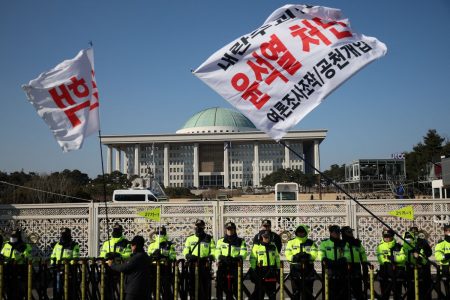Shortly before the end of 2022, notices were published for the construction of two important waste management infrastructures. These are the Waste Treatment Units (WTUs) of the Eastern Sector of Western Macedonia and Larissa, with a budget of 241.9 million euros and 54.6 million euros.
In particular, the Regional Association of Solid Waste Management Agencies (FOSDA) of Central Macedonia announced a public open tender for the selection of a contractor for the construction and operation of the Waste Treatment Unit (WTU). The contract includes the construction of the project, the supply of the mobile equipment, a six-month trial operation of the unit as well as its normal operation for six years.
According to the terms of the tender, FOSDA can modify the contract (right of option) if it deems it necessary to increase the production of secondary fuel and the recovery of recyclable materials, reduce the residue of the plant, receive and process separately collected recyclable materials and recover energy from the processing of preselected organics.
The specifications of the eastern Thessaloniki unit
The project includes the construction of the WTU, which will process 150,200 tons/year of which:
• 128,200 tons/year of mixed waste. It will process 36% of the produced mixed garbage of the regional unit of Thessaloniki, the mixed waste of the regional unit of Halkidiki, the residues of the KDAU (Recyclable Materials Sorting Centers) of Halkidiki and Eastern Thessaloniki (15% each) as well as the residues of the bio-waste processing units of Halkidiki and Eastern Thessaloniki (10% each),
• 22,000 tons/year of pre-selected waste. This is the 1st MEVA (bio-waste treatment unit) of the Upper Sector of Thessaloniki, which, according to the approved Regional Waste Treatment PlanPESDA of Central Macedonia, will serve the Municipality of Thermi and 65% of the Municipality of Thessaloniki. The unit will utilize the produced biogas to produce thermal energy for the needs of waste fuel production. It will have a biogas production efficiency of at least 80 Nm3 per ton of incoming material to be processed, with a minimum methane content of 55% vol.
Also, among other things, the contract includes the preparation of the application study, the supply of mobile equipment, the trial operation of the project for 6 months and the normal operation for six years. The project has been included in the operational program “Infrastructure, Transport, Environment and Sustainable Development 2014-2020” (YMEPERAA), while the construction of the project and the six-month trial operation is co-financed by the Cohesion Fund, with own resources and credits from the Public Investment Program . Its six-year normal operation is financed by the Central Macedonia FODSA’s own resources, as are the options. The deadline for submitting bids is 17 February 2023, while they will be opened on 23 February.
Project location
The selected location for the construction of the proposed Processing Unit belongs administratively to the Municipality of Thermi, Thessaloniki and in particular is located in the municipal section of Vasilikon and specifically in the location “Agios Antonios”. It is located between the settlements of Kato Scholari and Agios Antonios. The total area of the site amounts to approximately 0.816 hectares (0.805 hectares licensed, with an extension of 1100 sq.m.). The ownership regime is mixed and consists of both private properties and public residential lands. The existing landfill (LANDFILL) at Tagarades is approximately 6.5 kilometers away.
Auction of the unit in Larissa
At the same time, the Region of Thessaly is also auctioning the WTU of Larisa, with a total estimated value of 100.3 million euros. The project includes the construction and equipment of the unit, with a budget of 54.6 million euros and options for a total cost of 45.6 million euros, related to the execution of additional works and equipment in order to convert the WTU into a Recycling Recovery Unit. for its adaptation to the National Waste Management Plan ESDA 2020-2030.
More specifically, a waste treatment line for mixed waste, a treatment line for pre-selected organic waste and the necessary infrastructure for environmental protection and functionality of the project will be built. The WTU will have a processing capacity of 61,479 tons/year of residual mixed waste from the municipalities of Larissa and 12,600 tons/year of pre-selected organic waste. The project includes the preparation of the application study, the supply of mobile equipment, its trial operation for 3 months and the normal operation of the MEA for six years. The facilities are located in the “Daouslar” area of the Parapotamos community of the Municipality of Tempi, at a distance of approximately 15.7 kilometers from the city of Larissa.
Energy production
At the Larissa unit, recyclable materials will be recovered and compost will be produced from the pre-selected organics and the organic fraction that will be separated from mixed municipal waste through mechanical sorting. The organic fraction will undergo biological treatment (anaerobic digestion and aerobic composting), and the produced biogas will be used for the production of electricity and thermal energy. The electricity will be available on the grid of the Administrator of the Hellenic Electricity Distribution Network and the thermal energy will be used for the thermal needs of the unit.
This is the third project promoted in Thessaly, which completes regional planning in the field of waste management. The other two concern the MEA of Western Thessaly which is in the implementation stage and the WTU of Magnesia which was auctioned last November.
With the auction of the units of Larissa, the eastern sector of Thessaloniki, Volos, Kavala and Naxos, as mentioned last November by the general secretary of the Waste Management Coordination Mr. Manolis Grafakos, speaking at an investment forum, “we are ending the auctions of public works for waste”, pointing out that then the waste management bodies will have to build projects through partnerships with private individuals or build them exclusively with their own resources, as “the State will no longer be obliged to undertake them”.



